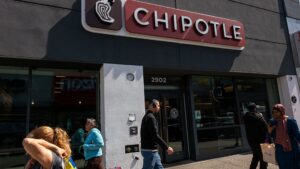The Rising Tide of Tariffs: How Businesses Are Navigating a Changing Landscape
As we continue to traverse the complexities of a modern economy marked by shifting trade policies and tariff implications, businesses are feeling the pressure. Recently, companies ranging from Procter & Gamble to Chipotle have slashed their profit forecasts, attributing much of their caution to the ongoing trade war and its ripple effects on consumer behavior. Here at the Extreme Investor Network, we believe understanding these dynamics is crucial for investors and businesses alike.
The Impact of Tariffs on Consumer Companies
This earnings season has not been kind to corporate outlooks, with over a dozen companies revising their forecasts downward. The consequences of tariffs, which increase costs on key imports such as Peruvian avocados and industrial components, are being felt across multiple sectors. As businesses grapple with rising expenses, the pressure to raise prices looms large.
In response to these challenges, brands may have no choice but to pass on increased costs to consumers. Sector giants like American Airlines and P&G are already signaling that price hikes may be on the horizon, a strategy that might help to offset declining profit margins. However, as baggage fees rise alongside airfare due to these tariffs, it could further alienate cost-conscious travelers.
The Chain Reaction of Higher Prices
Tariffs aren’t simply theoretical; they manifest as real costs that ripple throughout the supply chain. As companies assess whether to absorb these costs or pass them along to customers, the choice is becoming increasingly difficult. American Airlines CEO Robert Isom expressed concerns over escalating aircraft prices, lamenting the burden on both airlines and their passengers. This sentiment is echoed across industries as companies strategize on how best to absorb or distribute these financial shocks.
We often see that in times of uncertainty, consumer behavior shifts. Beverage giants like Keurig Dr Pepper are feeling the heat, with increased production costs leading to cautious pricing strategies. Yet, their strong earnings in recent quarters post an interesting narrative about selective resilience in the face of broader economic challenges.
A Cautionary Consumer
One of the subtler, yet profound, impacts of tariffs is the psychological toll on consumers. Recent data showed consumer sentiment plummeting to its second-lowest point since 1952, prompting many shoppers to tighten their belts in anticipation of rising prices and potential economic instability.
P&G CFO Andre Schulten pointed out that this shift in consumer mindset directly correlates with a reduction in consumption. The cautious attitude isn’t just anecdotal; it’s evident in the metrics as major retailers report reduced foot traffic and sales. Chipotle, for instance, noted a decline in customer visits driven primarily by financial anxieties.
Sector-Specific Challenges
Different sectors are not equally affected by the current economic environment. Chipotle is among the first major restaurant chains to acknowledge slowing traffic, as consumers become increasingly selective about their dining choices. The fast-casual chain has adjusted its outlook for same-store sales, reflecting a broader trend of "wait and see" among diners.
On the aviation front, Delta Air Lines has sounded the alarm, blaming nervous consumer sentiment alongside tariff-induced pricing pressures for lowered demand, particularly in the economy class. Airlines like American and Southwest are navigating uncharted waters, as all major carriers pull back their guidance amidst unpredictable market conditions.
Strategic Adaptation in a Tumultuous Market
The key takeaway for investors and business leaders is the need for adaptability. While the economic landscape feels precarious, proactive strategies can cushion the impact of these external pressures. As tariffs and international trade dynamics evolve, companies must pivot swiftly, utilizing innovative sourcing strategies and pricing models to remain profitable.
At Extreme Investor Network, we continually monitor trends and insights that can help guide your investments in this tumultuous era. By staying ahead of the curve, you can better position yourself to navigate challenges and seize opportunities.
Conclusion
The current state of tariffs and consumer sentiment provides a critical lens through which to evaluate business health and investment strategies. Understanding these interconnections will not only prepare you for the upcoming challenges but also place you in a position to capitalize on the insights gleaned from this shifting landscape.
So, as we continue to parse through this complex web of economic intricacies, remember to stay informed and engaged—your next investment move could depend on it. Keep following Extreme Investor Network for deep dives and expert analyses that make sense of today’s volatile market.

